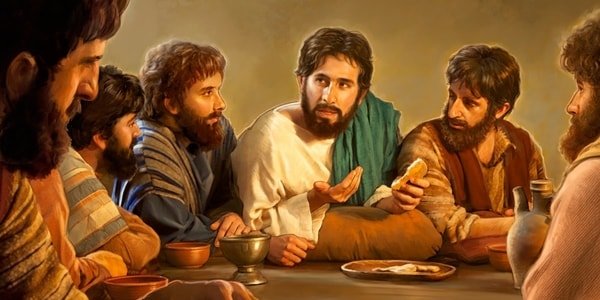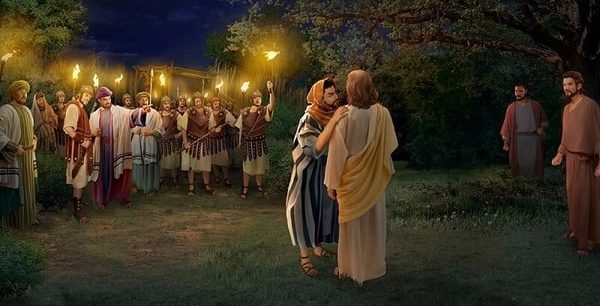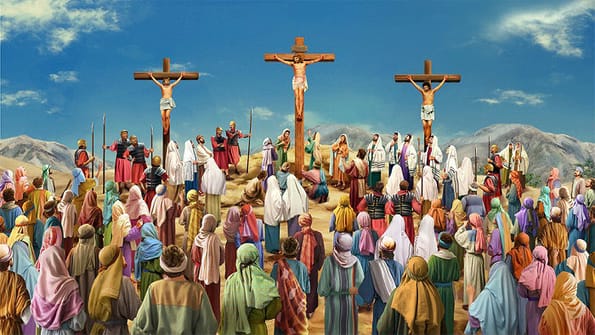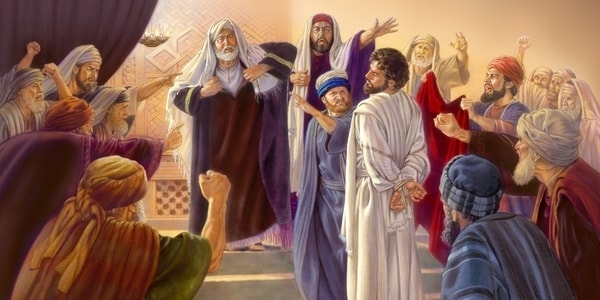Back to: CHRISTIAN RELIGIOUS STUDIES JSS2
Welcome to Class !!
We are eager to have you join us !!
In today’s Christian Religious Studies class, We will be discussing The Passion, Death and Resurrection of Jesus Christ. We hope you enjoy the class!
The Passion, Death and Resurrection Of Jesus Christ
The Triumphant Entry (Matt 21:1-11, Mark 11:1-11, Luke 19: 28-44)
The triumphant entry into Jerusalem marked the beginning of the last week of Jesus on earth. When He saw that His time to die was near, He went down to Jerusalem where He prepared Himself for the sufferings ahead of Him.
As Jesus and the disciples approached Jerusalem, they came to the town of Bethphage on the Mount of Olives. At the mount Olives, He said to two of His disciples, “Go into the village over there, and you will see a donkey tied there, with its colt beside it. Untie him and bring him here. If anyone asks what you are doing, just say, ‘the Lord needs him,’ and he will immediately send him.”
The two disciples did as Jesus said. They brought the animal to him and threw their garments over the colt, and he sat on it. Others spread leafy branches on the road as Jesus rode on the colt. A colt signifies peace.
The entire crowd that followed Him cried out saying, “Hosanna, blessed is He who comes in the name of the Lord, blessed is the kingdom of our father David that is coming. Hosanna in the Highest”.
Some of the Pharisees among the crowd were not happy with the way the people hailed Jesus as the Messiah. They asked Jesus to silence His disciples and the crowd. But He answered, “I tell you, if these were silent, the very stones would cry out”.
The triumphant entry of Jesus into Jerusalem is celebrated today among Christians as the Palm Sunday during Easter. His triumphant entry proves that Jesus is the Messiah and the saviour of the world.
The Last Supper (Mathew 26: 17-30)
On the first day of the feast of the unleavened bread, Jesus disciples came to ask Him where they should prepare for the Passover feast. He sent them to a certain man’s house to prepare the place for their celebration of the Passover feast. The disciples did as they were told.
In the evening, Jesus sat at the table to eat with His disciples, and when they were eating at the table Jesus told them that one of them would betray Him. The disciples were sorrowful and asked Him who it was. Judas, who betrayed Him, said, “Is it I, master?”. Jesus said to him, “You have said so”.
After that, Jesus took bread and gave it to His disciples after blessing it, saying that it is His body. He also gave them wine from a cup to drink, saying it is His blood which is poured out for the forgiveness of sins. He also said He would not drink such wine again with them until some times in His father’s kingdom. And when they had sung a hymn, they went out to the Mount of Olives.

The celebration of the last super among Christians today is known as the Lord’s Supper, the Holy Communion or Eucharist. The Passover feast was a celebration among the Jews to mark their liberation from political bondage in Egypt (see Exodus chapter 12). But Jesus gave it a new meaning when He celebrated it with His disciples. It signifies the spiritual liberation from sin for all who believe in Him.
The celebration of the last supper stands for the sacrificial death of Jesus on the cross to save us from sins.
Moral Lesson
- Jesus Christ showed humility by riding on a colt instead of a horse. Like Jesus, we should be humble no matter our status, gifts and position in life.
- We must accept Jesus Christ as the Messiah just as the people proclaimed Him to be.
- Jesus Christ obeyed and observed the Jewish Passover feast. This teaches us that we must obey the laws of our land and the rules in the church as Jesus did.
- We must be willing to give ourselves and our possession for service to God just as the householder gave his house for the celebration of the Passover to Jesus and His disciples.
The Betrayal and Arrest of Jesus Christ (Mark 14: 43-52, Matt 26:47-56)

While Jesus was still speaking to His disciples, Judas came with a crowd of people from the chief priest and others to arrest Jesus. Judas greeted Jesus and kissed Him as a sign for His arrest. Immediately Jesus was arrested, Peter drew his sword and cut off the ear of the high priest’s slave. But Jesus rebuked him and told him to keep his sword back. Jesus said further that His arrest was for the fulfilment of the scriptures.
Jesus also rebuked the crowd for coming to arrest Him with swords and clubs as a robber and not in the day time when He preached to them openly in the temple. When He was arrested, His disciples left Him and ran away. But a young man believed to be John Mark followed Him. He later ran away when he was almost arrested leaving his linen cloth behind.
The Trial of Jesus (Matt 26:57-68)
From the garden of Gethsemane where Jesus was arrested, He was taken to the high priest named Caiaphas. Peter followed Jesus at a distance to the high priest’s place where the council members had gathered to try Him.
The chief priest and all the members of the council were present to try Jesus. They sought for false accusations from people against Jesus but found none. Two men accused Jesus of saying that He would destroy and rebuild the temple in three days. But Jesus said nothing to all the accusations made against Him. When He was asked if He was Christ the Son of God, Jesus replied, “Yes, it is as you say. And in the future you will see me, the Son of Man, sitting at God’s right hand in the place of power and coming back in the clouds of heaven.”
Thus, the council accused Him of blasphemy and He was condemned to death. The people spat on Jesus, struck and mocked Him, saying “prophesy to us, you Christ! Who is he that struck you?”
Peter’s Denial of Jesus (Matt 26: 69-75)
Peter was sitting in the courtyard while Jesus was being tried. A maid identified Peter as one of the followers of Jesus but Peter denied it. This happened a second time and at the third time, Peter still denied Jesus. Then the cock crowed and Peter remembered what Jesus told him that “Before the cock crows you will deny me three times” and he went out and wept bitterly.
Instances/Situations that could make a Christian Deny Christ or Deny His/Her Neighbour
- Persecution and death.
- Family pressure.
- Peer pressure.
- Life situation.
- Love of money and pleasure of life.
- Loneliness or absence of friends or a companion.
- Mockery from friends and associates.
- Poor Christian foundation.
- Unholy ambitions.
- Fear of punishment.
- Tell lies to escape punishment or get a favour.
- Swearing in the name of God, to tell the truth then proceed to tell lies.
- When we are attacked by non-Christians.
The main message is for us not to deny Christ no matter the situation or circumstances we find ourselves.
THE DEATH AND BURIAL OF JESUS CHRIST
The Crucifixion (Matthew 27:32-44)
Then they led him away to be crucified. As they were on the way, they came across a man named Simon, who was from Cyrene, and they forced him to carry Jesus’ cross. Then they went out to a place called Golgotha (which means Skull Hill).
The soldiers gave him wine mixed with bitter gall, but when he had tasted it, he refused to drink it. After they had nailed him to the cross, the soldiers gambled for his clothes by throwing dice. Then they sat around and kept guard as he hung there. A signboard was fastened to the cross above Jesus’ head, announcing the charge against Him. It read: “This is Jesus, the King of the Jews.”
Two criminals were crucified with Him, their crosses on either side of His. The people passing by shouted, abused, and shook their heads in mockery. “So! You can destroy the Temple and build it again in three days, can you? Well then, if you are the Son of God, save yourself and come down from the cross!”
The leading priests, the teachers of religious law, and the other leaders also mocked Jesus. “He saved others,” they scoffed, “but he can’t save himself! So he is the king of Israel, is he? Let him come down from the cross, and we will believe in him! He trusted God, let God show his approval by delivering him! For he said, ‘I am the Son of God.'” And the criminals who were crucified with him also shouted the same insults at Him.

Moral Lesson
- We must not devise evil against others as a result of envy or hatred, as the chief priests and other members of the Jewish council did.
- We must not be part of those who delight in persecuting the righteous, bringing down others and spreading rumours against them.
We have come to the end of this class. We do hope you enjoyed the class?
Should you have any further question, feel free to ask in the comment section below and trust us to respond as soon as possible.
In our next class, we will continue our discussion and insight into The Passion, Death and Resurrection of Christ. We are very much eager to meet you there.


Hi
I like the teaching